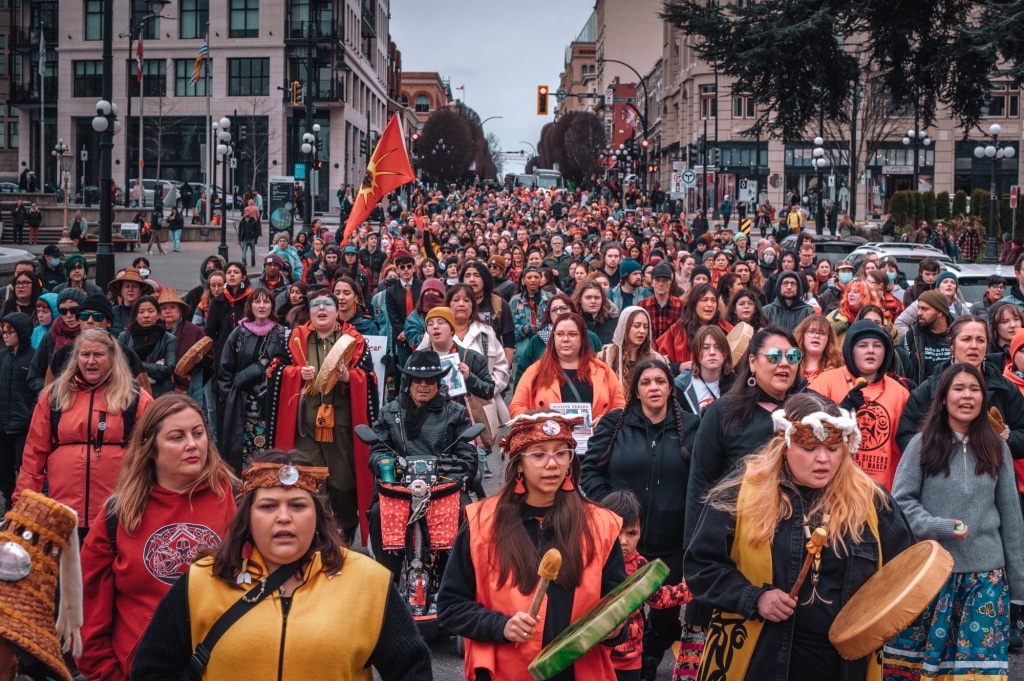rewrite this content and keep HTML tags
Content warning: This story contains details about “Canada’s” genocidal epidemic of MMIWG2S. Please look after your spirit and read with care.
Around 600 people marched through lək̓ʷəŋən territories on Saturday, remembering the thousands of Indigenous women, girls, and 2SLGBTQ+ people who have been disappeared or murdered throughout “Canada’s” ongoing colonial legacy.
The Stolen Sisters Memorial March in “Victoria” was inspired by the Women’s Memorial March in “Vancouver” which began in 1992 following the murder of Cheryl Ann Joe, a shíshálh woman and mother of three young boys, whose body was found near a warehouse in East Vancouver. Since then, marches have sprung up across the province and country around Valentine’s Day, demonstrating a collective movement to uplift families impacted by the crisis.
This year’s Stolen Sisters Memorial March was the 14th annual event and took place on Feb. 10. The annual march in “Vancouver” will take place on Feb. 14.
During the Saturday event, many people held signs in memory of their missing loved ones or donned the colour red as a way to pay respects and call for justice.
“The Stolen Sisters Memorial March is for us to hold a really beautiful space for all,” said Lisa DeWit, a Wet’suwet’en woman from Laksilyu Clan and one of the march organizers. “For some it is healing…We fight and search everyday, and this is the one day we can be held by community.”
DeWit added that for others the march is to help people “understand the systems that intersect with violence against Indigenous women, LGBTQ, Two-Spirit, and children in our communities. Others will be there to show support for those of us who are impacted. It is a memorial; it is centred in love.”
Indigenous women are 400 per cent more likely than other Canadians to go missing, and an estimated 4,000 Indigenous women and girls went missing or were murdered in “Canada” from 1956 to 2016. According to the 2019 National Inquiry into MMIWG2S, the country’s epidemic of violence towards Indigenous women, girls and 2SLGBTQQIA people “amounts to a race-based genocide.”
“It is a memorial to remind society as a whole that we are still searching and that the pictures we hold are of beautiful humans that are loved,” said DeWit at the march. “It is a reality for many of us here today that we know a truth: that you can be disappeared from this earth in a blink of an eye.”
“Our communities are here to uplift us,” said ŦEȺLIE Brianna Bear, who welcomed those gathered to her ancestral homelands of the Songhees, lək̓ʷəŋən people. “As we stand together, we are able to raise our voices a little louder, to bring more awareness about what we are doing and to be able to also bring healing, which is very much needed for a lot of us.”
“It’s with all the love in the world that we all come together today, HÍSW̱ḴE thank you,” said Elder May Sam of Malahat Nation, who shared a prayer and a song “for all the families who are hurting and in a lot of pain, those who have lost a daughter, an aunt, those who are missing, those who have not been found, there’s no closure for families, their pain.”
“We have to look at the root of this violence in the face,” said Gina Mowatt, who is Gitxsan, Lax Seel of Gitanmaax from the house of Luutkudziiwus and Xsimwitjinn. “Part of the goal [of colonization] is to destroy our knowledge systems, our kinship systems, our legal orders, our governance systems, our sovereignty. And gender-based violence plays a huge role in that.”
ŚW̱,XELOSELWET Tiffany Joseph, who is W̱SÁNEĆ, Sḵwx̱wú7mesh and Quw’utsun, said Indigenous women are a cornerstone of Indigenous societies. “When they wanted to steal the land, they targeted the women and girls because we were the strength. We are the strength. We are the backbone.”
The National Inquiry into MMIWG2S+ revealed that “persistent and deliberate human and Indigenous rights violations and abuses are the root cause behind Canada’s staggering rates of violence against Indigenous women, girls and 2SLGBTQQIA people.”
“We are grateful for those who have committed to upholding the values that our Indigenous communities hold — of protecting our feminine, our Two-Spirit, and our masculine,” said DeWit. “Take care of each other … Sing loud in unity, and let them know we are still searching.”
Read the full article here


